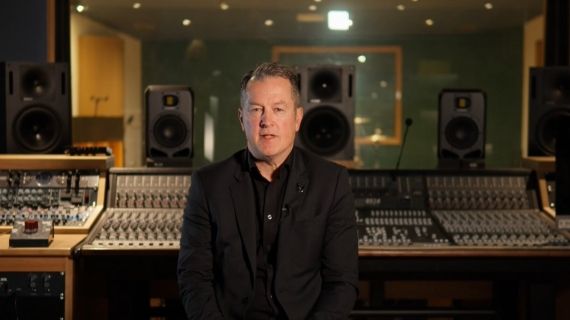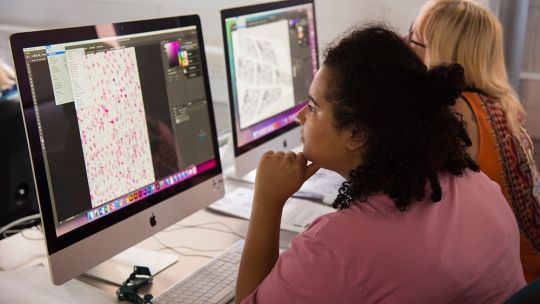FDSc Software Developer
- Study Mode: Part Time
- Location: High Wycombe
- Duration: Four Years
- Start Date: September 2026
You can also study this course:
Do you love the idea of creating apps and software? Want a job in computing but not sure where to start? A Higher Technical Qualification (HTQ) in Software Development could be exactly what you’re looking for.
This two-year course focuses on training real-world skills, to an industry-agreed standard. This means you can graduate with the exact skillset that some of the biggest companies in the country are looking for.
* Please note this course is Subject to Validation.
Why study this subject?
The world runs on computers. Almost all businesses and organisations rely on complex computer-based systems for their day-to-day operation. There is an ever-increasing demand for people with the skills to update, maintain and enhance software.
This programme has been carefully designed by our industry expert academics, based on standards set by professional bodies, to provide you with the skills and abilities needed to thrive in the fast-moving software industry.
FdSc HTQ Software Developer offers you the opportunity to get a broader understanding and expertise in a range of areas, from management and costing to project delivery. Gaining a solid grounding in these skills is crucial in ensuring that you graduate as a well-rounded and efficient software developer.
We aim to provide you with a practical education in software development to help ensure you are prepared for employment.
As an HTQ course, this runs for two years with an industry-certified focus on employability and hands-on training.
After graduation, you will also have the option of adding an additional top-up year for a full BSc honours degree.
Why study at Buckinghamshire New University?
FdSc HTQ Software Developer is a part of BNU’s College of Creative Arts, Technology and Engineering. This means that you will have access to a team of expert lecturers who have vast experience working in their respective fields. This exciting degree allows you to explore the diversity of modern software development, learning the integral skills required for today’s industry workplace. We do not just teach in the classroom; you will increase your knowledge through involvement in real-life projects and gain hands-on experience of working either individually or in a software development team.
You will be learning from innovative, forward-thinking, and highly motivated expert staff. Our lecturers have close industrial links and all work together to ensure that you have the best possible enriched and stimulating learning environment.
We regularly invite guest lecturers to share their experience and expertise. We also host day-long interactive events run by leaders in their field, giving you the chance to put your knowledge into action.
We know that the industry is constantly changing and rapidly evolving, which is why we are committed to implementing new and improved technologies in our topics, teaching and facilities.
BNU has invested heavily in providing first-class facilities, both in terms of hardware and software. Providing our students with the tools and experience necessary for employment after graduating.
As a BNU student, you're automatically a member of our Students' Union which means that joining a society is completely free - thanks to The Big Deal.
What facilities can I use?
BNU has invested in our facilities to ensure that you can learn on industry-standard systems and software. This means that you can make an easy transition from education into employment.
We have a range of custom-built computer labs, equipped with the latest convex screens, dual boot (Windows and Linux) systems and supporting hardware. Our devices also have industry-standard software. The labs provide the best spaces to nurture the specific skills needed for game and internet development. All of this allows you to build your skills within key areas of future employment, with the same tools you would use in the workplace.
Hands-on experience is what this course is all about. We have numerous devices that will provide the basis for various supervised projects you will carry out across the programme. These include, but are not limited to: Virtual Reality headsets, 3D printers, Raspberry Pi microcomputers, and EEG headsets.
We also provide online facilities to enhance your independent learning, via our Virtual Learning Environment. This will provide you with access to additional material and collaborative learning tools 24/7. And our virtual server technology will allow you to use our operating systems remotely.
What will I study?
During this course you will acquire skills in programming, building secure web and mobile applications and work on team-based software projects; whilst exploiting an agile development approach.
You will learn how to develop highly dependable and reliable systems, within an object-oriented design approach. This is done using several industry-standard approaches, such as UML (Unified Modelling Language). In addition, you will develop an understanding of the process involved in managing the development and testing of large-scale software projects.
From your first day onwards, you will be studying topics including:
- programming concepts
- computer architecture
- networking
- web development
- computing computational fundamentals
- software engineering
- object oriented analysis design
- real-time systems (team project)
- web application development
- algorithms and data structures.
How will I be taught and assessed?
Our instructors are a mix of expert academics and industry specialists. They bring their academic, industry, and commerce expertise to teach you both theory and practical skills. essential for your career.
At Buckinghamshire New University, we prioritize interactive, student-focused teaching. We offer formal lectures, tutorials, seminars, and guest speakers to enhance your learning.
Our courses are designed to mimic real workplaces. You'll engage in independent study, supported by distance learning tech like our Virtual Learning Environment. We'll provide reading lists and suggested resources to aid your independent study.
We see you as an individual, not just a number. Our tutors maintain regular contact hours and provide ongoing informal, personalised feedback.
You'll be assessed in various ways to nurture your skills. Expect practical coursework, lab tests, and written exams with a focus on applying what you've learned.
What are the course entry requirements?
A typical offer will require a UCAS tariff score of: 88 - 104
UCAS points can be obtained through qualifications such as A levels, T levels, BTEC or an Access to Higher Education course in a relevant subject. Please list all your qualifications on the application form as you will be asked to provide copies when we receive your application.
A minimum of two full A-levels (or equivalent) is required. Every application is considered on an individual basis. For further details of our international English entry requirements, please visit our international pages.
Applicants who do not meet the minimum requirements for the three-year undergraduate programme, or those who do not feel fully prepared for a degree course, can apply for a four-year programme including a Foundation Year; find out more.
Modules
This provides a guide of the modules that make up your course. You can find more information about how your course is structured on our Academic Advice section.
What are the tuition fees
Please note all of the 2026/27 academic year fees stated are subject to parliamentary procedure. Tuition fees are expected to increase each academic year in line with the maximum permitted value set by the Government for that academic year. The expected rise for Home undergraduate students (including those on a foundation year course), may impact both new and continuing students.
What are my career prospects?
This degree prepares you for a job as a software developer. When you finish after two years, you can work in a variety of different areas such as finance, computer games, retail, transportation, security, healthcare, and defence.
You could find yourself in organisations covering large multinational, public-sector bodies, and government projects with multi-billion-pound budgets at one end of the scale to small consultancy firms at the other.
With such a range of jobs and industries available after graduating, you could work on a wide variety of projects. You will work closely with developers, product managers, graphic designers, and business analysts to find out what clients want and the most efficient way to achieve that.
You might be responsible for working on either the replacement of a complete system or modifying software and integrating it into existing networks.
As a software developer, your daily tasks could include:
- talking through requirements with clients
- testing software and fixing problems
- maintaining systems once they are up and running
- being a part of technical designing
- integrate software components
- producing efficient codes
- writing program codes for reference and reporting.
Course leader




